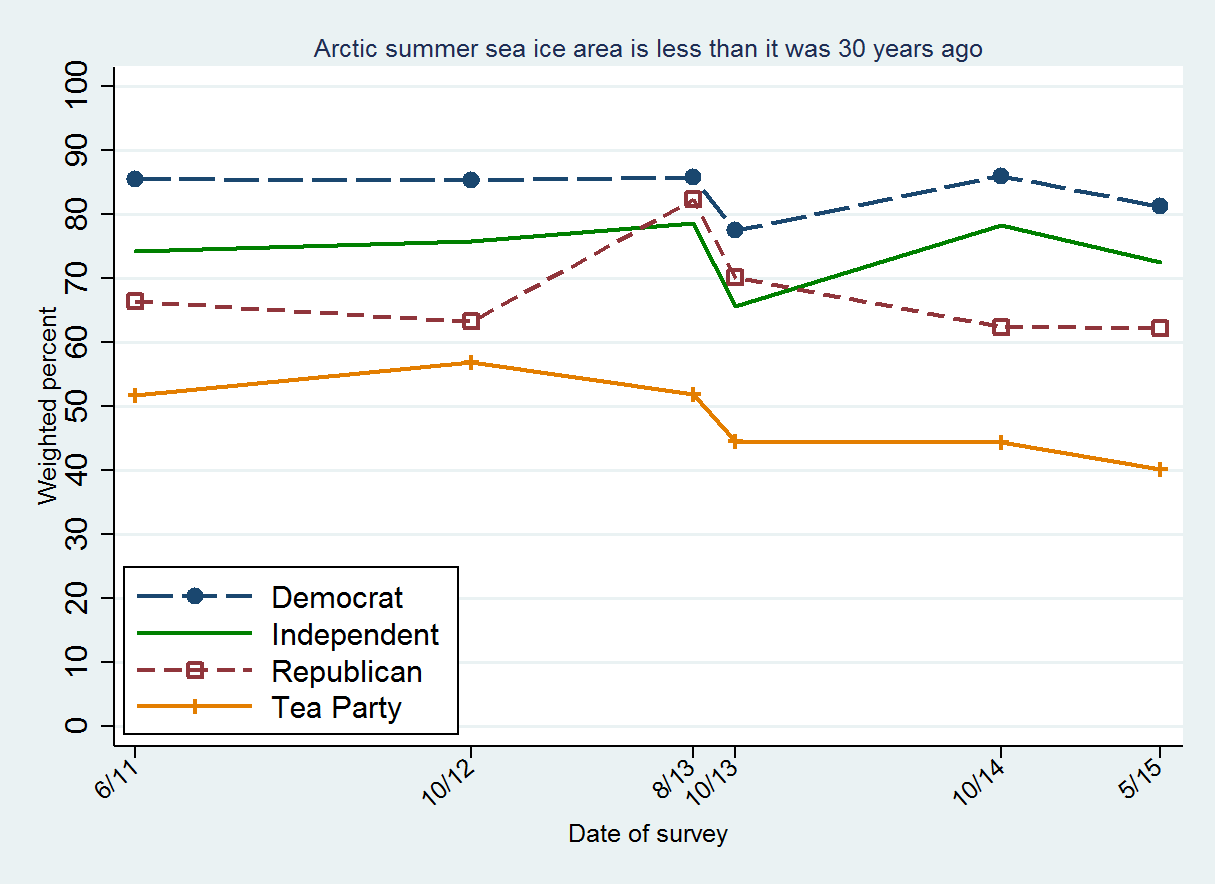Conservatives Are The Most Delusional
Global warming is a scientific issue, a phenomena to be investigated, like gravity, magnetism, electricity. It's not social science which always has a political component. Well, evolution does seem to generate a similar division along the political dimension, but mostly for religious reasons. While there isn't any religious aspect to global warming, there certainly is a political one, and it is distinctly expressed along a conservative/liberal dimension. But most interesting is that Tea Party conservatives, the most conservative group, are the most delusional, that is, they believe the most strongly that they are right even though they are wrong.
A paper published in Polar Geography, and described here, studied this issue. There are certain facts indisputable scientifically, that polar ice is disappearing, that Arctic warming is affecting our weather. People of various political views were asked about these issues, and there's a clear result: the more conservative the less knowledgeable.


The striking result is how poorly the Tea Party members do on these questions. But there's something more interesting. It is possible to be overconfident, having an answer, and then believing strongly that one has the correct answer even though it's wrong.
Overconfidence is not significantly related to age or gender (Fig. 4A and B). It is somewhat more prevalent among people with postgraduate education (Fig 4C), but larger differences occur by political party (Fig 4D) and climate-change beliefs (Fig. 4E). Democrats, Independents and Republicans are not far apart, whereas Tea Party supporters significantly more often (61%) combine high self-assessed understanding with low knowledge. Rates of overconfidence are similarly high (60%) among those who think climate change is not happening.
Tea Party people, the most conservative, are the most over-confident by far. They are the most wrong, but believe strongly that they are correct.
The false sense of understanding has ideological roots. Previous studies found that Tea Party supporters report the highest levels of understanding about climate change (Leiserowitz et al. 2011, pdf; Hamilton and Saito 2015). That occurs in these surveys as well: 43% of Tea Party supporters, compared with just 18% of Republicans, 21% of Independents, and 31% of Democrats say they have “a great deal” of understanding about climate change. Polar knowledge scores, however, point in the opposite direction: only 27% of Tea Party supporters, compared with 31% of Republicans or Independents, and 39% of Democrats, answered two or three questions correctly.
A paper published in Polar Geography, and described here, studied this issue. There are certain facts indisputable scientifically, that polar ice is disappearing, that Arctic warming is affecting our weather. People of various political views were asked about these issues, and there's a clear result: the more conservative the less knowledgeable.


The striking result is how poorly the Tea Party members do on these questions. But there's something more interesting. It is possible to be overconfident, having an answer, and then believing strongly that one has the correct answer even though it's wrong.
Overconfidence is not significantly related to age or gender (Fig. 4A and B). It is somewhat more prevalent among people with postgraduate education (Fig 4C), but larger differences occur by political party (Fig 4D) and climate-change beliefs (Fig. 4E). Democrats, Independents and Republicans are not far apart, whereas Tea Party supporters significantly more often (61%) combine high self-assessed understanding with low knowledge. Rates of overconfidence are similarly high (60%) among those who think climate change is not happening.
Tea Party people, the most conservative, are the most over-confident by far. They are the most wrong, but believe strongly that they are correct.
The false sense of understanding has ideological roots. Previous studies found that Tea Party supporters report the highest levels of understanding about climate change (Leiserowitz et al. 2011, pdf; Hamilton and Saito 2015). That occurs in these surveys as well: 43% of Tea Party supporters, compared with just 18% of Republicans, 21% of Independents, and 31% of Democrats say they have “a great deal” of understanding about climate change. Polar knowledge scores, however, point in the opposite direction: only 27% of Tea Party supporters, compared with 31% of Republicans or Independents, and 39% of Democrats, answered two or three questions correctly.


Comments
Post a Comment